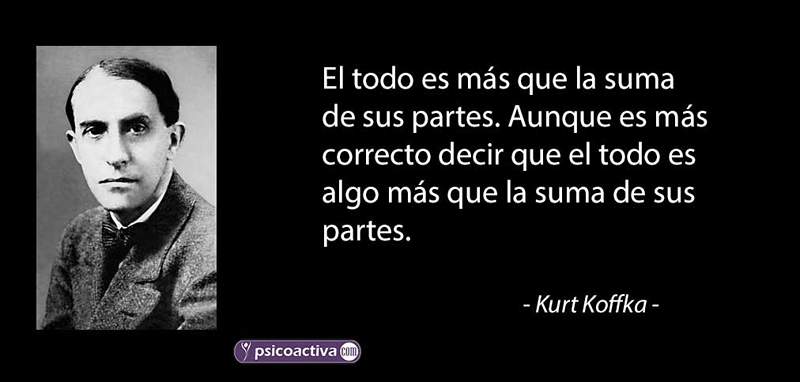Kurt Koffka phrases

- 4595
- 1285
- Perry Hirthe
Kurt Koffka was a German psychologist highlighted for his contributions in the area of the Gestaltic psychology.
In addition to having studied in Berlin, Kurt Koffka also spent a stay in Scotland, which allowed him to learn English and spread his thinking.
Koffka recognized the importance of learning at an early age, to which he referred as "sensory-motor learning". Among his thinking, Koffka's belief stands out that children learned consequently.
That is, a child who touched a hot stove would not do it again due to the unpleasant motor sensory experience he had experienced.
In a medium in which many talked about imitation learning, Kurt Koffka dared to mention ideational learning, in which language is crucial, then, There was no more important for Koffka than when a child learned to assign names to objects.
Next, we will see some most notorious phrases of Kurt Koffka's thought, In order to have an idea what his theory tried.
Kurt Koffka phrases
The whole is more than the sum of its parts. Although it is more correct to say that the whole is more than the sum of its parts.
Psychology is a very unsatisfactory science.
If an environmental trail is in close connection with the ego system, not only will it be in communication with the particular temporal structure of that system with which it communicated at the time of its formation; But due to the coherence of the entire temporal system of the ego, it will also be in communication with the subsequent strata "
A complete theory should answer, among others, the following questions, given two contiguous retinal areas of different stimulation, under what conditions the corresponding parties of the behavioral field (perceptual) will appear of different whiteness, but equal shine (or "lighting"), When of different brightness, but the same white? A complete answer to this question would probably provide the key to the complete theory of color perception in the broadest sense ".
Behavior, of course, is possible without science. Human beings continued their daily affairs long before the first spark of science appeared. And today there are millions of people living whose actions are not determined by anything we call science. Science, however, could not stop gaining an increasing influence on human behavior. Describe this influence approximately and briefly will shed a new light on science. Exaggerating and schematizing the differences, we can say: In the pre -scientific stage man behaves in a situation like the situation tells him to behave. To the primitive man he tells him what he is and what he should do with her: a fruit says: "Eat me"; The water says: "bébeme"; Thunder says: "fear", and the woman says: "Ama me".
Apply the category of cause and effect means discovering which parts of nature are in this relationship. Similarly, applying the gestaltic category means discovering which parts of nature belong as parties to functional totalities, discovering their position in these, their degree of relative independence and the articulation of all greater in subset in subset.
Why do we see things and not holes between them. Now we can try an answer to the question of why we do it. Two of the organization factors that we have discussed so far seem to me the most important causes of this effect. First, the segregation and unification that occurs will separate areas of different degrees of internal articulation, and according to our law, the most articulated will become figures, the others merging to form the background. Look at any landscape photography. You see the shape of things, mountains, trees and buildings, but not heaven.
We have discussed the quantity, order and meaning regarding their contributions to science in general and psychology in particular. We extrajust each of our categories of a different science, but we affirm that, despite its different origins, they are all of universal application. And, in fact, in our treatment of the topics involved in each of our three categories we have found the same general principle: to integrate quantity and quality, mechanism and vitalism, explanation and understanding or understanding, we had to abandon the treatment. of a series of separate facts for the consideration of a group of facts in its specific form of connection. Only then could the amount be qualitative, and order and meaning could be saved from being introduced into the system of science as new entities, the privileges of life and mind, or discarded as mere fictions. Do we then affirm that all the facts are contained in groups or units so interconnected that each quantification is a description of the true quality, each complex and sequence of ordered and significant events? In short, do we affirm that the universe and all the events in it form a great Gestalt?
Know what gestalt therapy is

